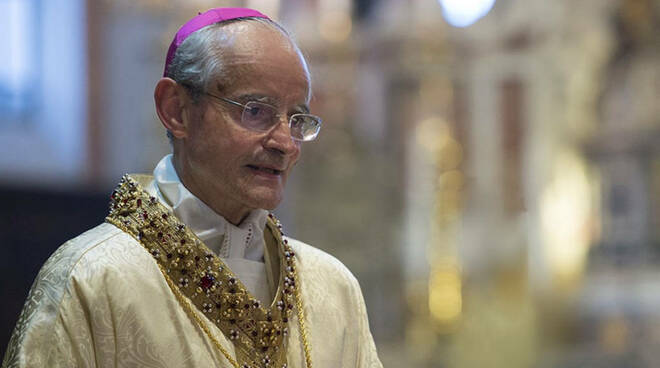Baby gang in Avellino. The words of the bishop Mons. Arturo Aiello, former parish priest in Piano di Sorrento
Mons.Arturo Aiello, bishop of Avellino and for many parish priest in Piano di Sorrento in the Parish of San Michele Arcangelo, speaks about the sad and worrying phenomenon of baby gangs: “They have been recorded in the last few days acts of violence against people and things in the city by teenagers who patrol at night armed with knives. The apparent tranquility of our town aligns itself with the evils of the metropolis without benefiting from the aid and cultural and social opportunities that are available in them. Baby-gang even here on our streets that from calm become ferocious? What drives our teenagers to threaten and hurt their peers, to provoke fights, to vandalize the bus station terminal or to smear the walls of the Church of the Rosary? What questions do these gestures refer to families, school complexes, the seats of the institutions, even of the Church?
I do not know the other institutions, but I feel I am being consulted as a Church, together with the parish priests and other pastoral workers, which is experiencing the fatigue of the recovery with halved liturgical assemblies, with the fear of the pandemic that still bites, with the increase in poverty. knocking on the doors of the Caritas Listening Centers, with a level of anxiety that rises exponentially in anticipation of a difficult autumn-winter like now at the announcement of the umpteenth heat wave.
In addition to being a phenomenon of public order, illegality and vandalism, we must let ourselves be questioned by these gestures and ask ourselves: what our eternally discontented teenagers lack who purr at home when it comes to asking for a pay raise and then on the street, never alone, they become protagonists of acts of violence? The answer that every educator gives to this question is: nothing. Our kids lack nothing, they have the necessary and the superfluous, they leave for the sea or for prize trips to European capitals, they smoke and sniff, they are late for returning late at night or at dawn, they are stationed outside the clubs or to the Capuchins in a precise and detailed weekly diary like a monastic calendar, they sleep during the day and live at night. They have it all and seem to lack everythingboredom is their inseparable companion. They are full and desperate.
I have no recipes to suggest, the phenomena are always iceberg peaks of larger and submerged inconveniences, which must be read and deepened, for this I use the interlayer “Maybe” which grants me the benefit of inventory and which could also open a broader and multi-voiced debate.
Maybe we need to go back to teaching that “life is Beautiful” despite a thousand privations and pains and that “To be there” it is worth more than any brand of designer shoes or t-shirts that are just the wrapping of a masterpiece that is the life of every man and woman for the mere fact of existing. Perhaps we have given too many things and a few “why” or “for whom” to live and fight?
Perhaps we are concerned about the recharging of the mobile phone and little about great motivations that can support them in the thousand tests of life, we have offered opportunities, but few questions to take away sleep, ideas, but not ideals, shoes, but not roads to go.
Maybe we didn’t broadcast the joy of simple thingsconviviality without binges, a glass of wine without getting drunk, an evening with friends playing the guitar and singing loudly because “life is now”, without excesses of haunted eyes and vomit on the landing.
Perhaps we have not conveyed the joy of the effort for a goal (“a joyful race to climb a hill” Pascoli would say) and that a hike in the mountains to conquer a peak or the beauty of an alpine lake are worth more than a night in Palos in a disco on the beach where the decibels shorten the distances for the epileptic threshold. Maybe we weren’t good at telling the beauty of being “hugged and dumb like boxers after a match, like the last survivors” (R. Zero) without having wild sex because Freud said “the more I do what I like, the less I like it what do I do”.
Maybe we have failed in trying to make people hear “Look, it’s raining outside, look what a nice noise!” (V. Rossi) and that it is nice “to be embraced when it rains” (E. De Crescenzo), that a caress is worth more than a black room, and a handwritten letter posted over a hundred video calls. We weren’t good at conveying the flavor of bread with oil or of “bread and chocolate”.
Perhaps we should have given less and more timefewer video games and more football matches, less “Yes” and more “No”. We should have taken them next to the beds where their peers struggle with gritted teeth with death and “In the gardens that nobody knows” (R. Zero) where young people like them sweat to make ten meters in an hour and it’s like winning the Olympics. Maybe we should have made them suffer more and not have a hard time in the analgesic culture that reigns where even a headache becomes a tragedy.
Perhaps we should tell them about their Ukrainian peers who, while vandalizing the station terminal here, are risking their lives for the freedom of their homeland and their people. Gianni Morandi in a song from fifty years ago entitled “At the bar you die” contrasted the lying idle at a table while in Vietnam other young people were gambling for their lives: “They’re shooting …”, “Have a coffee!”, ” They are dying… ”,“ But think for yourself! ”. Our teenagers are dying of boredom, while elsewhere they offer their lives for the freedom of their land.
Maybe we should have educate them to feelings while their affective encephalogram is flat and they do not know how to give names to their moods that remain suspended, we should have taught “that it is nice to talk” as Filumena Marturano finally converted to the art of tears closes in the third act. We who cried as children in the finale of Vittorio De Sica’s “Bicycle Thieves” which brought the drama of post-war Italy to the big screen in black and white, we wanted our children to laugh in a coarse and empty way when the crater of work and the thieves of serenity is still so vast and contemporary.
Perhaps we still have time to teach them that the world we have found should be left to posterity in a better situation, even our city. Perhaps we still have time to avoid other acts of vandalism by employing them to take care of the greenery and that in Piazza Libertà, like Piazza Duomo for Umberto Saba, it can be a meeting place where “instead of stars / in the evening, words light up”. Perhaps we will be able to see them watering the roses instead of kicking, like skittles, the traffic signs of the light rail.
Perhaps all is not lost and, as I write this, many teenagers are busy animating summer activities for the little ones, like in Parco Palatucci where thirty are at the service of two hundred children for the sake of good. Perhaps we are struck by the acts of violence and we do not see the germs of goodness that secretly crowd the places of associations, because, as we know, “a falling oak makes more noise than a growing forest”.
Perhaps we are not irremediably lost and we can implement common good strategies where the boys save the boys. Perhaps…”.




